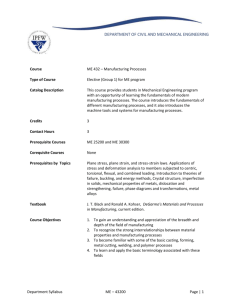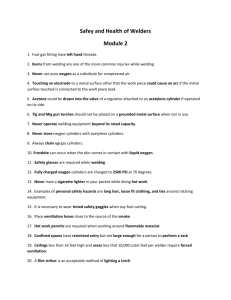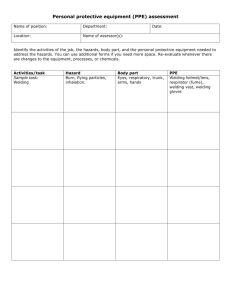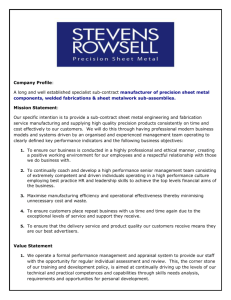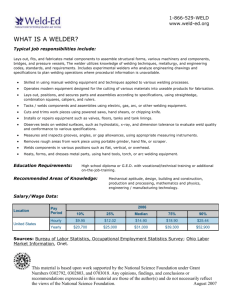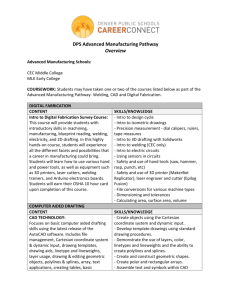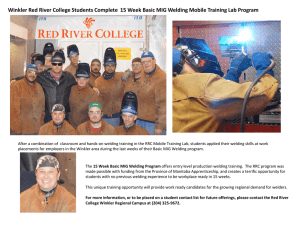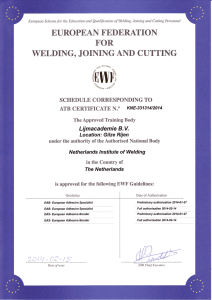Materials Applications and Processes
advertisement
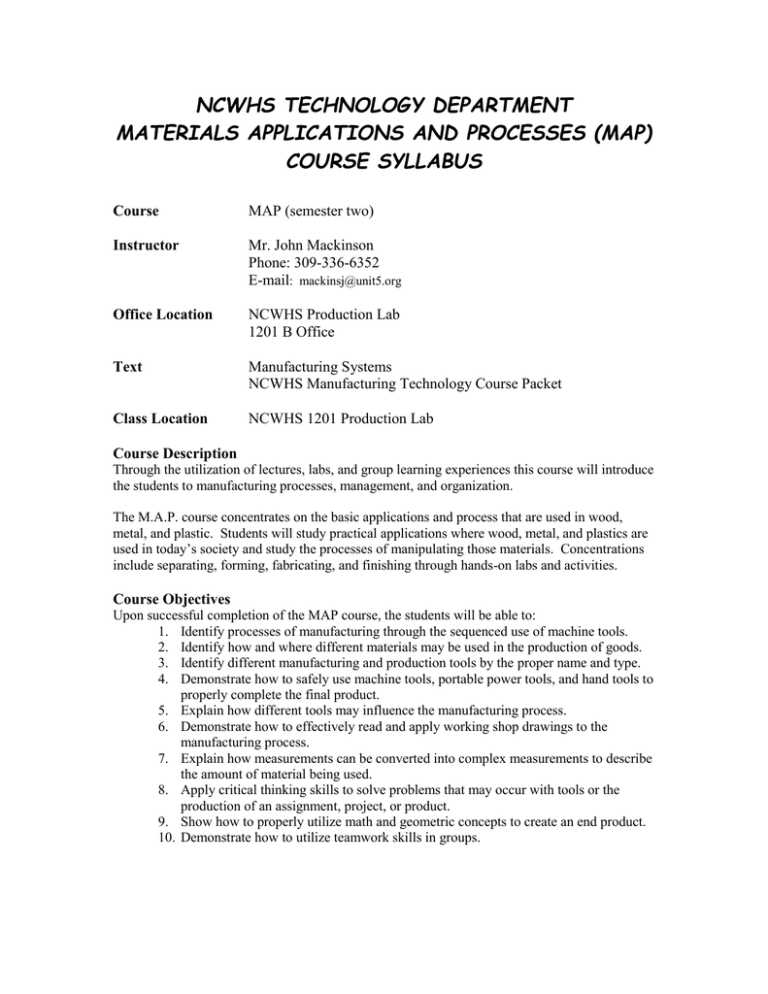
NCWHS TECHNOLOGY DEPARTMENT MATERIALS APPLICATIONS AND PROCESSES (MAP) COURSE SYLLABUS Course MAP (semester two) Instructor Mr. John Mackinson Phone: 309-336-6352 E-mail: mackinsj@unit5.org Office Location NCWHS Production Lab 1201 B Office Text Manufacturing Systems NCWHS Manufacturing Technology Course Packet Class Location NCWHS 1201 Production Lab Course Description Through the utilization of lectures, labs, and group learning experiences this course will introduce the students to manufacturing processes, management, and organization. The M.A.P. course concentrates on the basic applications and process that are used in wood, metal, and plastic. Students will study practical applications where wood, metal, and plastics are used in today’s society and study the processes of manipulating those materials. Concentrations include separating, forming, fabricating, and finishing through hands-on labs and activities. Course Objectives Upon successful completion of the MAP course, the students will be able to: 1. Identify processes of manufacturing through the sequenced use of machine tools. 2. Identify how and where different materials may be used in the production of goods. 3. Identify different manufacturing and production tools by the proper name and type. 4. Demonstrate how to safely use machine tools, portable power tools, and hand tools to properly complete the final product. 5. Explain how different tools may influence the manufacturing process. 6. Demonstrate how to effectively read and apply working shop drawings to the manufacturing process. 7. Explain how measurements can be converted into complex measurements to describe the amount of material being used. 8. Apply critical thinking skills to solve problems that may occur with tools or the production of an assignment, project, or product. 9. Show how to properly utilize math and geometric concepts to create an end product. 10. Demonstrate how to utilize teamwork skills in groups. Lab Objectives The 1201 lab is designed to provide students an opportunity to put manufacturing theories taught in lectures, labs, and group learning experiences into practice. The activities are designed to enable students to experience manufacturing steps by: reading and manipulating given plans, demonstrating how to effectively utilize industrial tools, analyzing the manufacturing processes required to complete the end product, and utilizing organizational management techniques to produce an end product. Lab Rules and Policy Beverages such as pop, milk, juice, and sports drink are prohibited from being in the lab. Then only beverage that can be brought into the lab is water in a water container. Any food items are also prohibited from the lab. All classroom rules outlined in the department rules sheet should be followed. The NCWHS 1201 lab will be open before and after school for student use. See the instructor to arrange a time. General Lab Clean-up Procedures All students who use the NCWHS 1201 lab have a responsibility for maintaining the lab and equipment whether using it during regularly scheduled class time or other times. Several general rules must be followed as a minimum requirement before students leave the lab after completing work: 1. All tools, materials, and accessories must be returned in clean condition to their proper storage location. 2. All machines must be properly shut down and cleaned of scrap and dust. 3. All work tables and benches must be cleared and cleaned. 4. All student projects, products, and materials must be placed in designated storage areas. 5. Floors must be swept. Safety Students without safety glasses will not be allowed to participate in lab activities and will not receive lab participation credit. All lab activities will be completed with personal and machine safety in mind first. State law requires that safety glasses are to be worn in the lab anytime activities are in progress. It is the student’s responsibility to provide OSHA approved safety glasses. The safety glasses must be marked Z87 ANSI approved to be worn in the lab. Safety glasses are sold by the NCWHS Technology Department for $4.00. It is strongly recommended that students wear clothing that is suitable for an industrial working environment. Clothing should be worn at the student’s own risk. Sandals and any other open toed and non heal covered shoe will not be permitted to be worn in the lab during the course activities. Long hair must be tied back and all shirts must be tucked in. All students will take a safety test over the tools that will be utilized in the lab. Each student is expected to receive a 100% on the safety exam before any work can start . Lab and Materials Fee Each student will be charged a $25.00 lab fee that will pay for consumable shop materials such as glue, screws, nails, dowels, and hinges. This fee does not cover the amount of money needed for hardwood lumber (oak). Students will be responsible for paying for lumber that they use based upon the board footage calculations. No projects will leave the production lab until full payment has been received. Course Supplies List 1. Tape Measure 2. Safety Glasses (Can be purchased in class for $4.00) 3. NCWHS “Master” combination lock (Must be purchased in the main office for $5.00) 4. 2 old T-shirts for stain rags 5. Notebook and Folder 6. Pencil everyday. Do not use ink to mark on lumber. Evaluation Attendance is the main priority in the MAP course. Everyday each student has the opportunity to receive 10 points of participation credit. If a student does not participate in the designed course activities the student will not receive full daily participation credit, 10 points. If a student has an excused absence they will not receive full participation points and will receive a grade of 7/10, a C average. If a student has an unexcused absence, is removed from the class that day, or is suspended, that student will receive a 0/10 points of credit. If a student would like to make-up the points missed for an excused absence or unexcused absence they can do so in the before and after school lab hours. The student must complete 50 minutes of lab time to make-up for one day of class time. Each project the students manufacture will be graded using a point based grading rubric. Each project will be graded on participation, project management, tool usage, measurement, and final project appearance according to the project plan. The grading scale for the MAP course is as follows: 100 – 90% = A 89 – 80% = B 79 – 70% = C 69 – 60% = D 59 – 0% = F Materials Applications and Processes Semester 2 COURSE SYLLABUS: (Spring Semester) I. Introduction of class / explanation of content Explanation of the course structure Overview of course projects and lab fees Rules and permission Sheet Student timesheet and explanation II. Unit 2: Manufacturing Materials Chapter 3 Materials and Manufacturing Chapter 4 Structure Materials Chapter 5 Materials Properties Chapter 3-5 Review Quiz Chapters 3-5 III. Unit 3: Primary Manufacturing Processes Chapter 6 Manufacturing Materials Chapter 7 Obtaining Raw Materials Chapter 8 Producing Industrial Materials Chapter 6-8 Review Quiz Chapters 6-8 IV. Unit 4: Secondary Manufacturing Processes Chapter 10 Casting and Molding Processes Chapter 11 Forming Processes Chapter 12 Separating Processes Chapter 13 Conditioning Processes Chapter 14 Assembling Processes Chapter 15 Finishing Processes Chapter 10-15 Review Quiz Chapters 10-15 V. Unit 5: Measurement Measurement Theory PPT Lesson Ch 9 Layout and Measurement Measuring Devices (Ruler, Dial Caliper, and Micrometer) Measurement Quiz VI. Unit 6: Blue Print Reading Reading Prints Book 1 Lessons 1-10 Print Reading Assessment VII. Unit 7: Grinding Machines Grinding PPT Lesson Grinding Review Grinding Assessment VIII. Unit 8: Separating Machines Separating PPT Lesson Separating Review Separating Assessment IX. Unit 9: Sheet Metal Tools Sheet Metal PPT Lesson Sheet Metal Review Sheet Metal Assessment X. Unit 10: Milling and Drilling Machines Milling and Drilling PPT Lesson Milling and Drilling Review Milling and Drilling Assessment XI. Unit 11: Lathes and Turning Lathe PPT Lesson Lathe Review Lathe Assessment XII. Unit 12: Welding and Fabrication Welding Safety PPT Lesson O-A Theory PPT Introduction to SMAW Theory PPT Introduction to GMAW Theory PPT Welding and Fabrication Review Welding and Fabrication Assessment XIII. Unit 8: Project 1 Rotation Introduction (1) Lathe and Milling / Thread ID Tool (2) SMAW (welding) / Production Test Joints and Mass Production Project (3) Sheet Metal / Dust Pan and Bolt Bins (4) Oxy-Fuel Cutting, Welding, Production Test Joints, and Mass Production Project (5) Group Fabrication, shear, and Metal Stocking (6) GMAW (welding) / Production Test Joints and Mass Production Project Project Organization / 1 school week and rotate Extra Material Project (If Time Allows) XIV. Unit 10: Machinery Part Fabrication Review Blue Prints Class Project Overview Start Production XV. Review for Final Handout Review Sheet Review Machines Student Question Time EVALUATION OF STUDENT ACHIEVEMENT: Evaluation will be done by grading homework assignments, tests, and quizzes. Evaluation will also be done through the grading of projects. Each project will follow a grading rubric. OPEN LAB TIME The 1201 lab will be open before and after school. Contact your instructor for open lab dates and times. FEES Each student will be charged a $25.00 lab fee that will pay for shop materials such as welding rods, welding gases, tooling apparatus, course project metal, and finishing supplies. This fee DOES NOT cover the amount of money needed for items such as locks, welding gloves, helmets, and safety glasses. Students will be responsible for obtaining a pair of safety glasses that are Z 87 approved. Safety glasses will be sold for $3.00 by the Technology Dept. If a student would like to buy welding gloves and / or helmets they can also be purchased through the Technology Dept. Welding gloves are $10.00 and welding helmets will be quoted upon request. Welding helmets and gloves are also available in the lab for student use. Locks can be purchased through the NCWHS main office. COURSE SUPPLIES LIST: 1. Tape Measure (8’ – 12’) 2. Safety Glasses (Can be purchased in class for $4.00) 3. Spiral notebook and folder 4. Pencil everyday 5. NCWHS “Master” combination lock (Can be purchased in the main office for $5.00)
